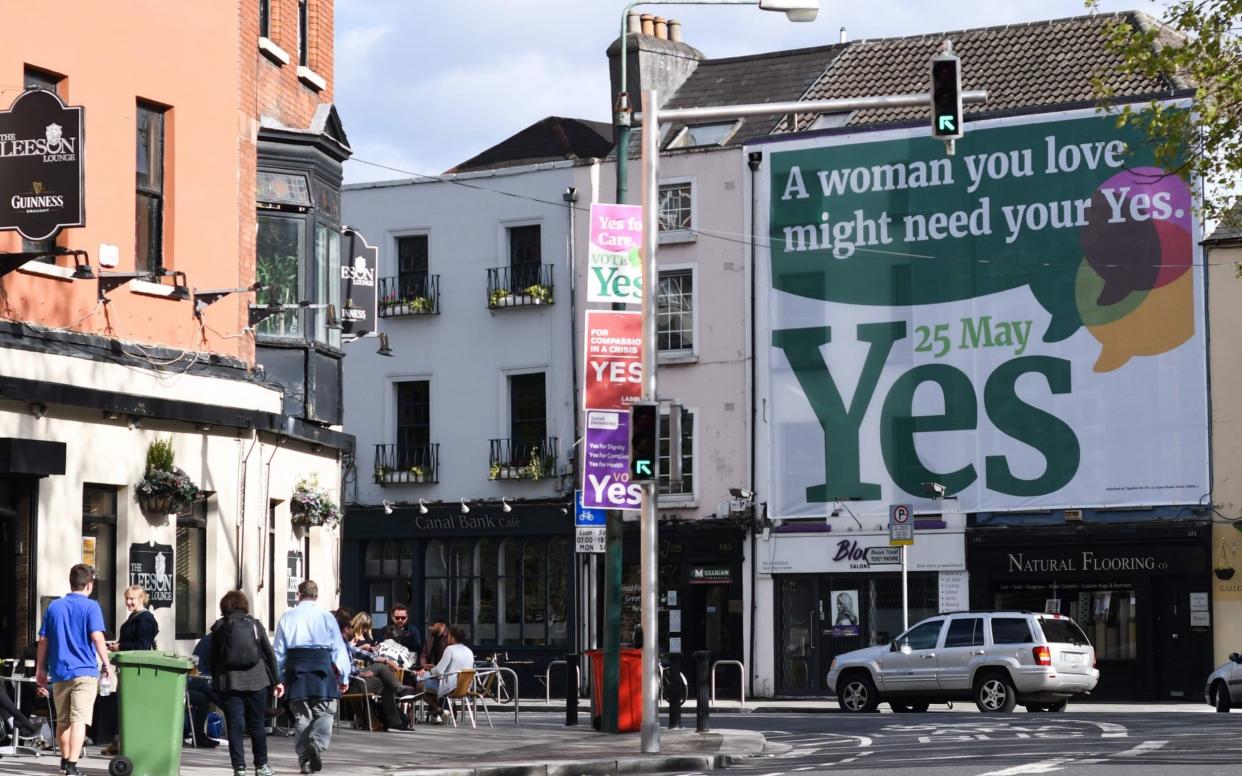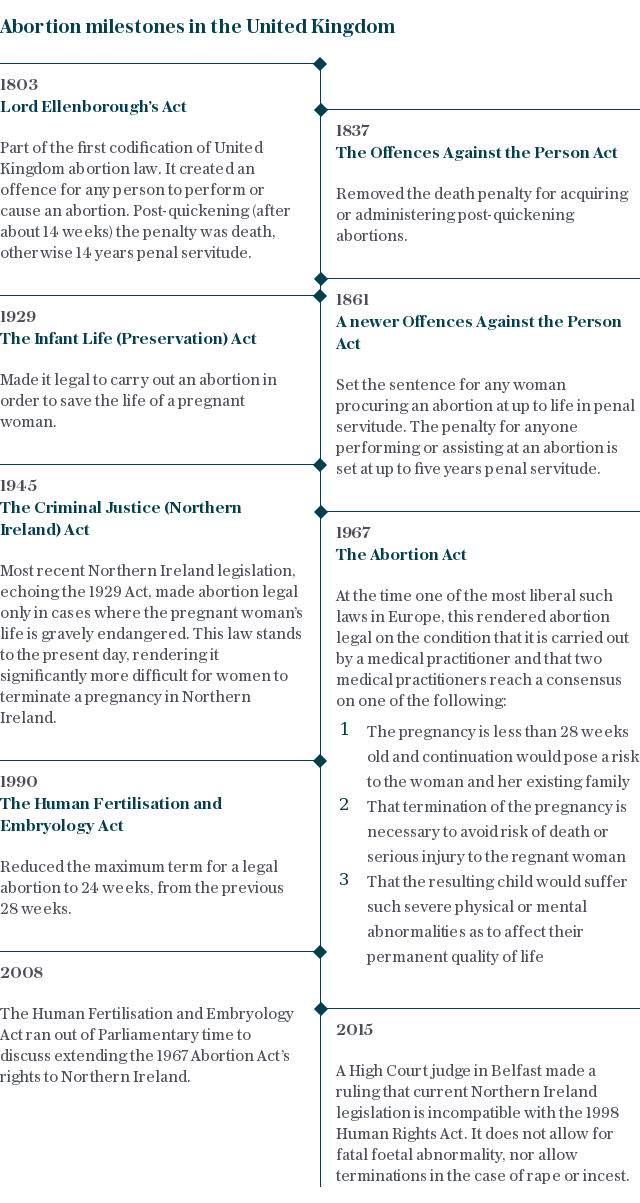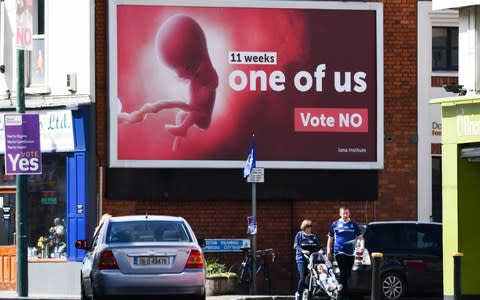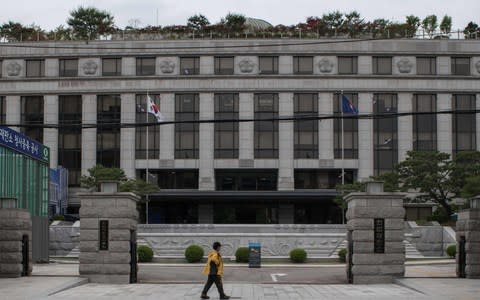Abortion around world: The countries with most restrictive laws and why debate is back in spotlight

Abortion is being thrust back in the spotlight this week, with a referendum in Ireland and a supreme court challenge in South Korea.
In the US, meanwhile, President Donald Trump has issued a rallying call to opponents of abortion, encouraging them to head to the polls to elect conservative lawmakers.
While many take the right to have an abortion for granted, the practice is still banned in some 20 countries worldwide. Others have highly restrictive laws in place.
The restrictions mean millions of women risk serious illness or injury every year as a result of clandestine and unsafe abortions.
Here is a snapshot of the global situation on abortion and the issues stirring the current debate.
Where is abortion banned completely?
Predominantly Catholic Malta is the only European Union country to totally ban abortion, imposing jail terms of between 18 months and three years if the law is broken.
Abortion is also banned in Andorra, the Vatican and San Marino, which are in Europe but not the EU.
Globally there are total bans in Congo-Brazzaville, Democratic Republic of Congo, Dominican Republic, Egypt, El Salvador, Gabon, Guinea-Bissau, Haiti, Honduras, Laos, Madagascar, Mauritania, Nicaragua, Philippines, Palau, Senegal and Suriname.
In El Salvador the internationally criticised criminalisation of those found to have terminated pregnancies has led to women being jailed, some serving terms of up to 30 years.

Where is abortion restricted?
Many countries allow abortions in cases where the mother's life is deemed to be in danger.
A partial list includes: Afghanistan, Bangladesh, Guatemala, Iraq, Ivory Coast, Lebanon, Myanmar, Oman, Paraguay, Somalia, South Sudan, Syria, Uganda, Venezuela, West Bank/Gaza and Yemen.
Last September Chile ended its strict ban, which had been in force for decades, when then president Michelle Bachelet signed into law legislation to decriminalise abortion in certain cases, including on health issues.
In Brazil a bill is under consideration in congress that would ban access to all abortions, even in cases of rape and for women whose lives are in danger.

Unlike the rest of the United Kingdom, abortion is also illegal in the province of Northern Ireland except when the mother's life is in danger. The British government said in June 2017 it would fund abortions in England for women arriving from Northern Ireland.
Other countries also allow abortions only in cases of rape or threat to the mother's or baby's health.
In EU member Poland, which has one of the most restrictive abortion laws in the bloc, a new bill, which could pass in parliament where conservatives have a majority, would outlaw abortion except in cases where the mother has been raped or is a victim of incest.

In the United States abortion was legalised nationwide in 1973, but has been under pressure since Donald Trump became president, with some Republicans seeking restrictions.
The US state of Iowa in early May signed into law a ban on abortions once a foetal heartbeat is detected, which occurs as early as six weeks into a pregnancy. The Midwestern state now has the strictest legislation on abortion in the US.
Irish referendum
In Ireland, voters head to the polls on Friday to decide whether to repeal a constitutional ban on all abortions except in cases where the mother's life is at risk.
Recent opinion polls have put the "Yes" camp ahead, but its lead has narrowed in some surveys, while around one in six people remain undecided.
A 1983 referendum approved outlawing abortion by a wide margin, but on a turnout of just over half the voting population.

Subsequent legislation ruled anyone having an abortion could face up to 14 years in jail.
The law has led to thousands of women travelling each year to Britain where abortion is legal.
It was tweaked in 2013 to allow terminations if the mother's life is at risk, following public outrage at the death of Savita Halappanavar, a pregnant woman originally from India who was refused an abortion.

Impetus for the new ballot also came from the case of Amanda Mellet, who was forced to travel to Britain for an abortion after she suffered fatal foetal abnormality.
Mellet took her case to the UN's Human Rights Committee, which ruled that denying her a termination in Ireland was a denial of human rights.
South Korean court case
A decades-old abortion ban that activists say endangers women will be challenged in South Korea's supreme court on Thursday.
Along with Ireland, South Korea is one of the few industrialised nations where the procedure is illegal except for instances of rape, incest and when the mother's health is at risk.
Women who terminate a pregnancy face a fine and a year in jail, while doctors who carry out terminations can get up to two years behind bars.

In reality, the 1953 law rarely results in prosecutions.But there are growing calls for change as activists argue criminalisation leaves women vulnerable to unsafe procedures and the changing whims of politicians as well as blackmail from their partners.
Calls to repeal the law have gained traction in recent years with more than 230,000 people signing a petition to legalise abortion last year.
On Thursday the Constitutional Court is due to review a challenge from a doctor who was prosecuted for performing nearly 70 abortions.
But opposition is staunch in a country that remains conservative towards female sexuality and highly influenced by evangelical Christianity.
Trump wades into abortion debate
Mr Trump weighed into the divisive issue on Tuesday, encouraging opponents of abortion to head to the polls to elect conservative lawmakers.
Addressing the Susan B. Anthony List's annual "Campaign for Life Gala," the US president took a victory lap for his anti-abortion policies and nominations of conservative justices to federal courts. But he warned the group that they must show up at the polls to preserve their gains under his administration.
"Every day between now and November we must work together to elect more lawmakers who share our values, cherish our heritage, and proudly stand for life," Mr Trump said. He summed it up for the roomful of enthusiastic supporters: "The story is, '18 midterms, we need Republicans."

Last week, the administration unveiled a new push to strip funding from Planned Parenthood and other family planning clinics. The initiative, which was formally unveiled on Tuesday, is aimed at resurrecting parts of a Reagan-era mandate banning federally funded family planning clinics from referring women for abortions, or sharing space with abortion providers.
Mr Trump promised a "massive campaign" to assist Republicans this autumn, and highlighted his role contributing toward the Republican National Committee's fundraising haul.
"Your vote in 2018 is every bit as important as your vote in 2016," Mr Trump said, reading off a teleprompter. He paused before telling the crowd, "I'm not sure I really believe that.
"I don't know who the hell wrote that line," he said, prompting laughs.

 Yahoo News
Yahoo News 
